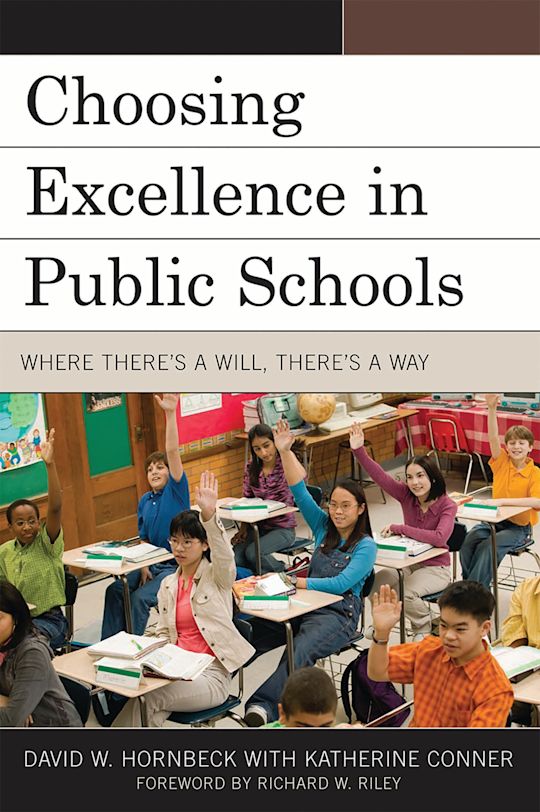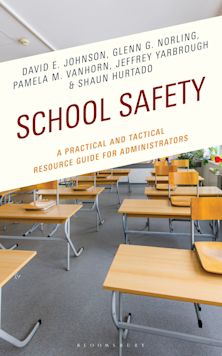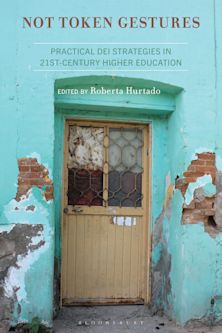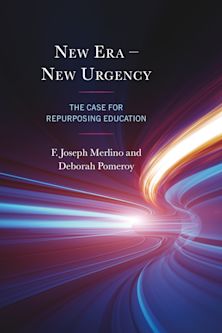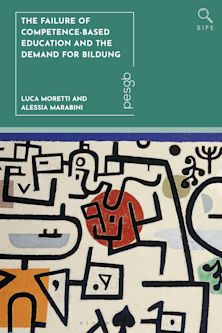- Home
- ACADEMIC
- Education
- Education Policy and Politics
- Choosing Excellence in Public Schools
Choosing Excellence in Public Schools
Where There's a Will, There's a Way
Choosing Excellence in Public Schools
Where There's a Will, There's a Way
This product is usually dispatched within 1 week
- Delivery and returns info
-
Free US delivery on orders $35 or over
You must sign in to add this item to your wishlist. Please sign in or create an account
Description
Choosing Excellence in Public Schools explains the origins of the low expectations we have of children, including, notably, children of color, those for whom English is a second language, poor children and children with disabilities. The book dispels the basis for low expectations. It makes clear the economic, demographic, civic, personal and moral imperative to educate all children to high standards and the consequences of not doing so. Hornbeck and Conner set forth a comprehensive, radical agenda based on proven practices and practical experience that will result in education success for virtually all children where faithfully implemented. This book breaks new ground. It establishes that the missing ingredient in school reform is the absence of values-driven, focused, well-financed, professionally staffed, technologically sophisticated grassroots expression of the public will insisting that the political, media, business, judicial and organized labor institutions that make the choices that result in our children's learning conditions make different, and effective choices. We get the education for our own children and grandchildren and those of others that we tolerate or demand.
Table of Contents
Chapter 2 The Power of Expectations
Chapter 3 The Origins of Low Expectations
Chapter 4 All Children Can Learn to High Standards
Chapter 5 All Children Must Learn to High Expectations
Chapter 6 We Know How to Make All Schools Effective: Children Achieving and Philadelphia Outcomes
Chapter 7 Standards
Chapter 8 Assessment
Chapter 9 Accountability
Chapter 10 Quality for Teachers
Chapter 11 Quality School Leadership
Chapter 12 Promising School Strategies (Part I): Instruction
Chapter 13 Promising School Strategies (Part II): Non-Instructional
Chapter 14 Resources
Chapter 15 The Choices We Make Determine School Effectiveness
Chapter 16 The Public Will to Make Diffferent Choices
Chapter 17 Walk the Walk: Choosing Excellence and Equity in Public Education
Product details
| Published | Jun 15 2009 |
|---|---|
| Format | Hardback |
| Edition | 1st |
| Extent | 300 |
| ISBN | 9781607091547 |
| Imprint | R&L Education |
| Dimensions | 9 x 6 inches |
| Series | New Frontiers in Education |
| Publisher | Bloomsbury Publishing |
About the contributors
Reviews
-
I've read dozens of books on why we ought to make all of our schools successful and how to do it. No one tells us more compellingly than David Hornbeck. He and Katherine Conner have done unique work describing the public will that must create powerful support for successful schools and how to sustain that will in a way to move mountains, elect governors, and mobilize a people. If we are to realize our dreams for public schools and America's children, if Barack Obama's crusade for change is to succeed, this book must be our roadmap and our inspiration.
Jim Hunt, founder, National Board for Professional Teaching Standards and former governor of North Carolina
-
David Hornbeck brings into clear focus the need to promote equity and excellence for all children, and he challenges educators, community leaders, and policy makers to make the hard decisions-the right decisions-on behalf of our nation's youth. His challenge, succinctly stated is, we know what to do-now let's get it done!
Gerald N. Tirozzi, executive director, National Association of Secondary School Principals
-
Hornbeck provides a comprehensive framework for urban school reform that is steeped in research, experience, and a set of shared values undergirded by the belief that all children have the wherewithal to achieve high standards given the appropriate supports. This book should be a touchstone for policymakers and practitioners who want to move beyond failure brought by dichotomous choices and silver bullets.
Warren Simmons, executive director, Annenberg Institute for School Reform, Brown University
-
I had the privilege of 'shadowing' David Hornbeck for six years while he was Philadelphia School superintendent for our PBS documentary, Toughest Job in America. Now this good man has written a book drawing upon his 40 years of working to improve educational opportunities for children in Kentucky, Maryland, Pennsylvania and the nation. Along the way he settles a few scores, but most of this book is devoted to lessons he has learned. His overarching message is that the work is far from finished-and neither is he! As Mr. Hornbeck concludes, "We know what to do and how to do it. The choices are ours. The consequences of our choices are the legacy we leave to our grandchildren."
John Merrow, education correspondent for The News Hour with Jim Lehrer and president, Learning Matters Incorporated
-
Hornbeck and Conner drew from two very appropriate historical traditions for the title of their book Choosing Excellence in Public Education. Thomas Paine, our American revolutionary hero and the African-American gospel songs urged their fellow countrymen to overthrow the unjust conditions of colonization and slavery by shouting and singing "where there's a will, there is a way." The way for school reform is clearly and beautifully chronicled and the shameful lack of political will is disturbingly and tragically reflected in the Philadelphia story of school reform. Repeating this tale in every urban school district in the country mocks our nation's promise that all men are created equal. Our English and African ancestors urge us to make a move for freedom through education.
Wendy Puriefoy, president, Public Education Network
-
David Hornbeck speaks 'truth to power' in this hard hitting urban school reform manifesto shaped through his experience as Philadelphia's outspoken superintendent of schools. He provides an unflinching portrait of the realities and challenges we face if we, as a nation, are to make good on the promise of an education system that is equitable and excellent for all.
Who better than David Hornbeck, leading national reform architect, former Philadelphia superintendent and Maryland chief state school officer, activist, lawyer and minister, to deliver an unflinching portrait of the realities and challenges of contemporary, urban school reform? His insights and guidance constitute a handbook for policy makers and school leaders committed to the continuing quest for equity and excellence.Paul Reville, Francis Keppel Professor of Practice of Educational Policy and Administration, Harvard University Graduate School of Education








